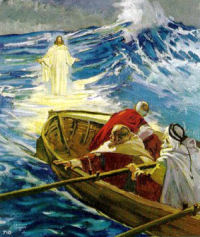
Daily Readings for:August 10, 2014
(Readings on USCCB website)
Collect: Almighty ever-living God, whom, taught by the Holy Spirit, we dare to call our Father, bring, we pray, to perfection in our hearts the spirit of adoption as your sons and daughters, that we may merit to enter into the inheritance which you have promised. Through our Lord Jesus Christ, your Son, who lives and reigns with you in the unity of the Holy Spirit, one God, for ever and ever.
RECIPES
o Late Summer into Fall Sample Menu
ACTIVITIES
o Religion in the Home for Elementary School: August
PRAYERS
o Book of Blessings: Blessing of Food or Drink or Other Elements Connected with Devotion
o Book of Blessings: Blessing Before and After Meals: Ordinary Time (2nd Plan)
· Ordinary Time: August 10th
· Nineteenth Sunday of Ordinary Time
Old Calendar: Ninth Sunday after Pentecost
During the fourth watch of the night, he came toward them walking on the sea. When the disciples saw him walking on the sea they were terrified. "It is a ghost," they said, and they cried out in fear. At once Jesus spoke to them, "Take courage, it is I; do not be afraid" (Matt. 14:25-27).
Click here for commentary on the readings in the Extraordinary Form of the Roman Rite.
The Feast of St. Lawrence, deacon and martyr, is superseded by the Sunday liturgy.
Sunday Readings
The first reading is taken from the first Book of Kings 19:9a, 11-13a and relates the story of Elijah in the cave and the Lord coming to him in a "still small voice."
The second reading is from the Letter of St. Paul to the Romans 9:1-5 in which St. Paul speaks of the sorrow of heart that he has because the Jews, as a nation, had refused to see Christ as the Messiah who was promised to them by God through their patriarchs and prophets.
The Gospel is from St. Matthew 14:22-33. Our Lord sent His disciples to row across the lake, knowing that they would meet strong, gale-force head-winds and be in danger. He did this because He wanted to strengthen their faith and trust in Himself. He intended to come to them at the right moment, working two miracles — walking on the water and calming the storm. This He did and the result was as He had intended — their faith in Him was strengthened, they declared He was the Messiah, the Chosen of God. Peter, already the recognized leader, and always the most daring among them, showed himself ready to risk drowning in order to prove his trust and confidence in Christ. While he trusted in Christ, all went well, but when his faith weakened he would have been lost were it not for the outstretched helping hand of his master. This was also a very necessary lesson in the education of Peter and his companions.
For us, too, there is a necessary lesson in this incident. It is that we must continue to trust in Christ and his loving Father, even when God seems to have deserted us. Most of the troubles and trials of our lives are caused by the injustice and lack of charity of our fellowmen. The remainder can be attributed to our own defects and sins or to some weakness in our mental and bodily make-up. But God foresees all these misfortunes, and can prevent them. Instead he lets them take their course, because they can and should be the means of educating us in our knowledge of life's true meaning and they should draw us closer to him.
Christ foresaw the storm and the grave risk His Apostles would run when He sent them off across the lake. But that trial and the grave danger they ran was for their own good, because they learned to realize that He was from God and they could always trust Him. Our trials and our earthly ailments are also foreseen by God and permitted by him (even if inflicted on us by a sinful fellowman) so that they will draw us closer to Him and help us on the road to heaven.
This they will do, if we accept them and bear with them until He comes to our aid. Our troubles in life are like the growing pains of our youth — they are necessary if we are to arrive at our full stature as sons of God. They form, mold and shape our religious character and bring us closer to God — if we allow them to do so. For the lukewarm Christian who rebels against God because of his earthly sufferings, they can do the opposite. He cannot see the purpose and value of suffering because he has never seriously pondered or grasped the real meaning of this life and God's loving plans for him.
As in the first reading today, God may not be in the tornadoes or earthquakes or roaring fires, nor does He cause them perhaps, but He is ever near to His true children when such calamities occur. He has a purpose in every trial or tribulation which crosses the path of our lives, a purpose always to our eternal advantage if only we will see and accept his will in these trials.
Excerpted from The Sunday Readings by Fr. Kevin O'Sullivan, O.F.M.